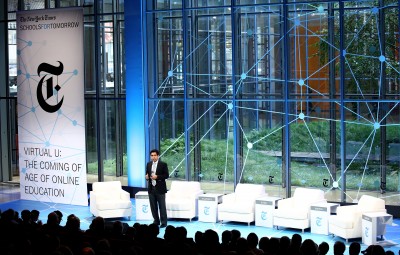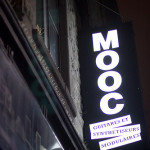Koller, Khan and Agarwal At The NYT’s Schools of Tomorrow Conference
By Paul Glader on October 4, 2013
Blended Learning, Domestic, MOOCs, Personalized Learning, Required, Startups, Technology, Universities & Colleges, Venture Capital
Sal Khan at The New York Times Schools for Tomorrow Conference, September 17, 2013.
By Anya Kamenetz, The Hechinger Report
As usual, the annual New York Times Schools for Tomorrow conference boasted a strong lineup of business people, policymakers and academics on the pulse of educational innovation, performing for an audience of prematurely jaded journalists, ostentatiously Luddite faculty members, and businesspeople who thought their own companies should have been lauded from the stage.
MOOCs for the 90 Percent
Daphne Koller of Coursera, Sal Khan of Khan Academy, and Anant Agarwal of edX talked about the potential of their free course platforms, not as one-way broadcasters of video, but as analytics environments that collect vast amounts of data on the learning process and feed it back to curriculum developers for analysis. On the other hand, Dean Florez, of the 20 Million Minds foundation, was unsparing in pointing out that MOOCs as they exist today are not optimized to help the students he called “the 90 percent” – the nontraditional, working-two-jobs, first-in-their-families-to-go-to-college–the ones who truly need the convenience and affordability of online ed. Referencing the San Jose-Udacity pilot in which MOOCs offered to high school students in collaboration with San Jose State posted dismal pass rates, Florez said, “We need to dig in and work with the real students.”
The CEO Checkup
Alec Ross, formerly Hillary Clinton’s technology guru at the State Department who focuses on digital divide issues, made a point I hadn’t heard before in quite this way. He brought up the analogy of the “CEO Checkup,” a superpremium health care visit for an executive whose health is deemed to be of strategic interest to a company’s future, which costs tens of thousands of dollars and results in an overload of data. The fear is that wealthy parents will over-utilize the new computerized learning opportunities and diagnostics, resulting in highly individualized education programs and an even bigger edge for their kids, while poor kids struggle in schools that barely have Internet access.
The Power of Open–And Research
I was personally thrilled to see David Wiley, the pioneer of open educational content, now helping school districts and community colleges adopt free digital textbooks with Lumen Learning, and Candace Thille, who has taken her groundbreaking Open Learning Initiative from Carnegie Mellon to Stanford, on a panel about how the move to digital can, if done right, increase equity and access.
Thille in particular sounded a note that should resonate throughout the world of ed-tech. “Twenty hours in the lab can save you one hour in the library,” she quipped, pointing out that too many of the startups we see today are rushing forward with various models of instruction–game based, adaptive, what-have-you–without being grounded in an existing literature of decades of learning science. “That’s what I’ve spent the last 10 years of my life doing,” she said. “One thing we found is that learning is really complex…Once a colleague asked me, ‘why do you study learning? We all teach, it’s not rocket science.’ Well, actually it’s more complex than rocket science. Really understanding human learning at that episodic moment where you have change in thought is a complex process.”
I was bemused to hear the reaction of her fellow panelist, Karen Cator, lately of the Obama Administration, Apple, and now Digital Promise. Although she heads up a well-funded nonprofit dedicated to spreading best practices on technology and education, she seemed to dismiss out of hand the notion that published academic research could find its way into the hands of edupreneurs or decisionmakers. Karen, if you find Thille’s paper
“An
Evaluation
of
Accelerated
Learning
in
the
CMU
Open
Learning
Initiative
Course
“Logic
&
Proofs””, too hard going, I give a quick overview in pp.120-123 of DIY U.
Related Posts


Tips & Pitches
Latest WA Features
-
Online Courses Are Expanding, Along With Questions About Who Owns The Material
-
Why Size Matters: Consolidation Sweeps Across US Higher Ed
-
Trend: Corporate U Employers Offering Just In Time Education To Workers
-
Subterfuge & Skullduggery In The College Rankings Game
-
“Instreamia” Shakes Loose Moss By Launching Spanish Language Mini-MOOC
Domestic, Education Quality, For-Profit, Friend, Fraud, or Fishy, K-12, Legislation, Opinion, Personalized Learning, Regulatory, Required, Universities & Colleges - Apr 29, 2014 - 0 Comments
Michael Horn: NCAA March Madness Followed By April Blunder In Online Learning
More In For-Profit
- The Economy Is Forcing Tuition To Fall Rapidly At Private, For-Profit Colleges
- Kamenetz: Jeb Bush As Controversial Leader Of Aspen Task Force on Learning & The Internet
- Columnist Ryan Craig: The Best Of Times Could Return As For-Profit Edu Invests
- Bubble Analysis: Trace Urdan on Why This Era of Ed Investing Could Be Different
- A Blended Path? How American Honors Cuts Cost of Four Year Degree by Over a Third
Community Colleges Cost of Education Domestic For-Profit Required Student Loans Universities & Colleges
Blended Learning, Domestic, Education Quality, Gamification, K-12, Open Source Education, Required, Startups, Technology - May 22, 2015 - 0 Comments
iCivics: Video Games as Middle School Social Studies Curriculum
More In Technology
- Online Education As A Postmodern Societal Response
- MakerBot Academy: A 3-D Printer In Every Classroom
- Michael Horn: A Look Behind The Curtain At How A MOOC Is Made
- Koller, Khan and Agarwal At The NYT’s Schools of Tomorrow Conference
- Video: New NESTA Report, Three Steps To Assess Digital Innovation in Education
Domestic, Education Quality, For-Profit, Friend, Fraud, or Fishy, K-12, Legislation, Opinion, Personalized Learning, Regulatory, Required, Universities & Colleges - Apr 29, 2014 - 0 Comments
Michael Horn: NCAA March Madness Followed By April Blunder In Online Learning
More In Friend, Fraud, or Fishy
- Online Education As A Postmodern Societal Response
- Apple Tightens Its 94% Choke-hold On The Education Tablet Market
- Michael Horn: Why Obama’s Proposals Won’t Entirely Revolutionize HigherEd
- Columnist Ryan Craig: The Curious Case Of HigherEd Accreditation
- McGraw-Hill Executive Speaking About Big Data: “Don’t look at us, look at Joe Camel”
Domestic Ebooks Education Quality Ereaders Ethics Friend, Fraud, or Fishy K-12 Publishers & Curriculum Required Textbooks











Reply